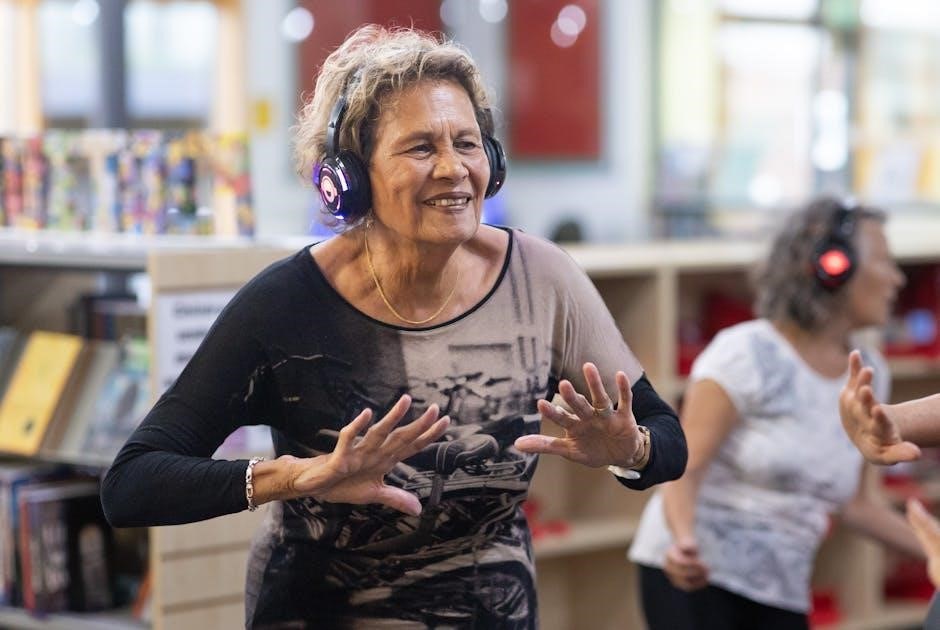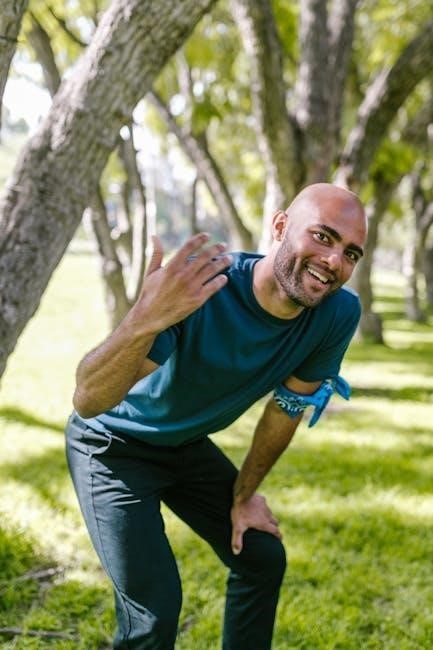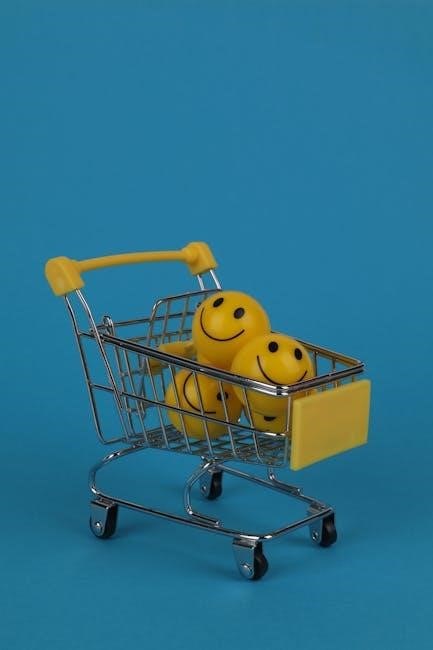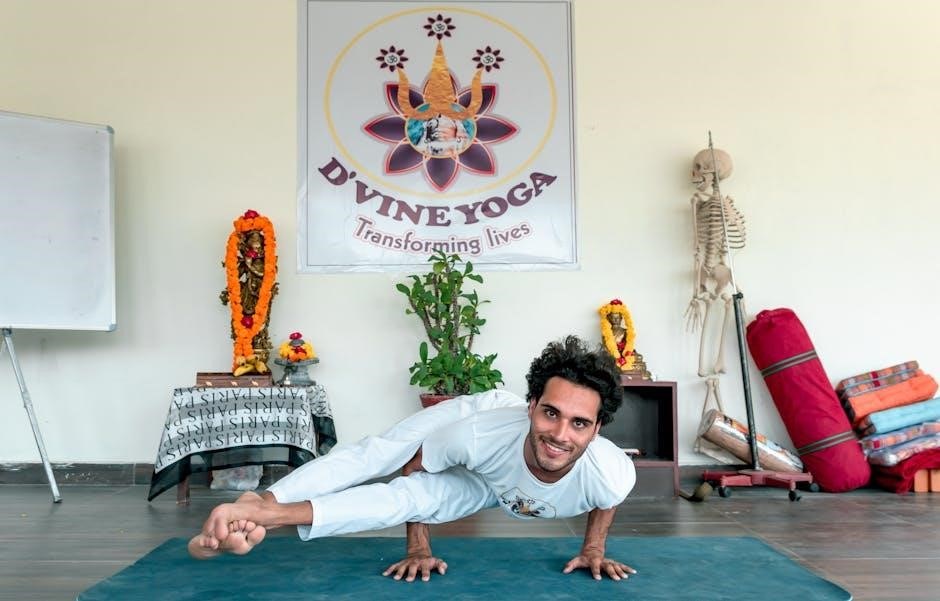
Engaging mental health trivia offers an interactive way to educate and reduce stigma while encouraging open conversations about wellness in a fun, accessible format․ Trivia fosters awareness, promotes understanding, and makes learning enjoyable through gamification and humor, creating a positive environment for mental health discussions․
Overview of Mental Health Awareness
Mental health awareness focuses on understanding and addressing conditions affecting emotional, psychological, and social well-being․ It emphasizes reducing stigma, promoting open conversations, and fostering education about mental wellness․ By engaging people in discussions and activities, awareness campaigns encourage seeking help and practicing self-care․ Trivia and interactive tools play a key role in making mental health education accessible and engaging, helping to break down barriers and promote a culture of support and understanding․
Importance of Making Learning Fun
Making learning fun enhances engagement and retention, fostering a positive environment for education․ Interactive tools like trivia transform complex topics into enjoyable experiences, encouraging participation and curiosity․ By incorporating humor and gamification, mental health education becomes accessible and less intimidating․ This approach not only boosts knowledge retention but also encourages continuous learning, creating a foundation for lifelong mental wellness understanding and appreciation․
How Trivia Can Promote Engagement
Trivia serves as a powerful tool to promote engagement by making learning interactive and enjoyable․ It breaks down barriers, encouraging participation and fostering a sense of camaraderie․ By presenting information in a question-and-answer format, trivia stimulates curiosity and motivates individuals to think critically․ The competitive yet friendly nature of trivia games creates a dynamic environment where people feel comfortable sharing ideas and learning together․ This approach not only enhances retention of mental health knowledge but also fosters a sense of accomplishment and shared understanding․

Benefits of Using Trivia for Mental Health Education
Trivia enhances mental health education by making it engaging and accessible․ It breaks stigma, fosters conversations, and uses gamification to simplify complex topics, promoting lasting understanding․
Breaking the Stigma Through Interactive Learning
Interactive learning, such as trivia, helps break mental health stigmas by fostering open dialogue and normalizing discussions․ Fun, engaging questions create a safe space for people to share experiences and gain knowledge without fear of judgment․ This approach not only educates but also encourages empathy and understanding, helping to dismantle stereotypes and misconceptions surrounding mental health․ By making learning enjoyable, trivia reduces barriers and promotes a culture of acceptance and support․
Encouraging Conversations About Mental Wellness
Fun mental health trivia sparks meaningful conversations, creating an informal setting where individuals feel comfortable sharing thoughts and experiences․ These discussions foster empathy and understanding, helping to break down barriers and reduce stigma․ By engaging in light-hearted yet informative questions, participants can explore mental wellness topics openly, encouraging deeper connections and mutual support․ Such interactions not only educate but also inspire personal reflections and proactive approaches to mental health, making it a powerful tool for fostering a culture of openness and awareness․
The Role of Gamification in Education
Gamification transforms learning into an engaging, interactive experience, making complex topics more accessible․ By incorporating elements like points, badges, and leaderboards, trivia games motivate participants to actively engage with mental health content․ This approach fosters a sense of achievement and friendly competition, enhancing retention and understanding․ Gamification also encourages repeated participation, allowing individuals to build knowledge over time․ Its effectiveness lies in creating a fun, low-pressure environment that makes mental health education both enjoyable and impactful, ultimately promoting long-term learning and awareness․ This method is particularly effective for sensitive topics like mental wellness, as it reduces intimidation and increases participation․

Key Components of Effective Mental Health Trivia
Effective mental health trivia requires clear, concise questions, varied formats, and accurate information․ Engaging elements like humor and team-based activities enhance participation, ensuring fun and impactful learning experiences․
Creating Clear and Concise Questions
Clear and concise questions are essential for effective mental health trivia․ They ensure understanding and engagement, avoiding ambiguity․ Use simple language and straightforward phrasing to make questions accessible․ Structure questions to focus on key concepts, such as “What is․․․” or “Which of the following․․․”․ Ensure answers are accurate and supported by reliable sources․ Keep questions relevant and up-to-date, reflecting current mental health knowledge․ Avoid jargon unless necessary, and provide brief explanations when needed․ This approach fosters a fun, inclusive environment for learning and discussion․
- Use simple, direct language․
- Avoid ambiguity or complex phrasing․
- Ensure questions are relevant and accurate․
Incorporating a Variety of Question Types
Incorporating diverse question types enhances engagement and caters to different learning styles․ Multiple-choice questions offer quick answers, while true/false options simplify complex topics․ Open-ended questions encourage critical thinking and discussion․ Scenario-based questions make concepts relatable, and trivia with humorous twists adds fun․ Including factual questions ensures accuracy and educates participants․ Mixing question formats keeps the trivia dynamic, fostering an enjoyable and inclusive learning environment for mental health awareness․
- Mix multiple-choice, true/false, and open-ended questions․
- Add scenario-based and humorous questions for variety․
- Ensure factual accuracy to educate effectively․
Ensuring Accuracy and Relevance of Information

Accuracy and relevance are crucial for mental health trivia to effectively educate and engage participants․ Questions must be factually correct, avoiding misinformation, as mental health topics are sensitive and impactful․ Sources should be credible, such as mental health organizations or scientific studies, to ensure reliability․ Regular updates are essential to reflect current research and societal understanding․ Well-researched trivia fosters trust and promotes meaningful learning, helping participants gain a deeper understanding of mental wellness․

The Science of Mental Health
Mental health science explores the brain’s function, emotions, and behaviors, emphasizing neuroscience, hormonal influences, and research-based practices to understand well-being and conditions affecting cognitive processes․
Understanding Common Mental Health Conditions
Common mental health conditions like anxiety, depression, and stress impact millions, affecting emotions, thoughts, and daily life․ Recognizing symptoms, such as persistent sadness or heightened worry, is key to early intervention․ Education through trivia can simplify complex topics, making them relatable and engaging․ By fostering awareness, trivia promotes empathy and encourages open discussions about mental wellness, helping to break the stigma surrounding these conditions and empowering individuals to seek support when needed․
The Impact of Stress on Mental Wellness
Chronic stress significantly affects mental health, often leading to anxiety, depression, or burnout․ It disrupts emotional balance, impairing concentration and mood regulation․ Prolonged stress can manifest physically, such as headaches or fatigue, and emotionally, through irritability or hopelessness․ Effective coping mechanisms, like exercise or mindfulness, can mitigate its effects․ Trivia games addressing stress management provide engaging education, helping individuals recognize symptoms and adopt healthy strategies, fostering resilience and overall mental wellness in a fun, interactive manner․
The Role of Neuroplasticity in Mental Health
Neuroplasticity, the brain’s ability to adapt and rewire, plays a crucial role in mental health recovery and growth․ Through practice and repetition, new neural pathways form, aiding in overcoming mental health challenges․ Trivia games that stimulate cognitive function can enhance neuroplasticity, fostering resilience and promoting positive mental well-being by encouraging active learning and engagement with mental health topics in a fun and accessible way․

Physical Health and Mental Well-being
Physical health significantly influences mental well-being․ Regular exercise, balanced nutrition, and adequate sleep improve cognitive function and emotional stability, fostering resilience and overall mental health through holistic practices․
Nutrition and Its Effect on Mental Health
Nutrition plays a crucial role in mental health by providing essential nutrients for brain function․ A balanced diet rich in fruits, vegetables, and omega-3 fatty acids supports cognitive health and emotional well-being․ Research shows that poor dietary choices can lead to increased symptoms of anxiety and depression․ Incorporating whole foods, vitamins, and minerals helps maintain neurotransmitter balance, promoting mental clarity and resilience․ A healthy diet is a cornerstone of holistic mental wellness, impacting both body and mind positively․
Exercise as a Tool for Mental Wellness
Exercise is a powerful tool for enhancing mental wellness by reducing stress, improving mood, and boosting self-esteem․ Physical activity stimulates the release of endorphins, which act as natural mood elevators․ Regular exercise can alleviate symptoms of anxiety and depression, promoting a sense of calm and well-being․ Even moderate activities like walking or yoga can have significant mental health benefits․ Incorporating exercise into daily routines fosters resilience and provides a healthy outlet for managing life’s challenges, contributing to overall mental and emotional balance․
Sleep and Its Importance for Cognitive Function
Sleep is essential for cognitive function, memory consolidation, and emotional regulation․ During sleep, the brain processes information, strengthens neural connections, and clears toxins․ Lack of sleep can impair concentration, decision-making, and mood stability, increasing stress and anxiety․ Quality sleep supports mental clarity, creativity, and problem-solving skills, while chronic sleep deprivation is linked to higher risks of mental health conditions like depression․ Prioritizing adequate sleep fosters a sharper mind and healthier emotional well-being, making it a cornerstone of mental wellness․

Emotional Intelligence and Self-Care
Emotional intelligence and self-care are vital for mental well-being, fostering self-awareness, empathy, and stress management․ Trivia games can engagingly educate on these topics, promoting healthy emotional habits․
Recognizing and Managing Emotions
Recognizing and managing emotions is a cornerstone of mental health․ Fun trivia questions can help identify emotional triggers and coping strategies, fostering self-awareness and emotional regulation․ Interactive quizzes can engage individuals in understanding their emotional responses to various situations, encouraging healthier emotional habits․ By incorporating relatable scenarios and practical tips, trivia games make learning about emotions enjoyable and accessible․ This approach not only educates but also empowers individuals to navigate their emotional well-being with confidence and clarity․
Practicing Self-Compassion and Mindfulness
Practicing self-compassion and mindfulness is essential for fostering emotional resilience and mental well-being․ Fun trivia questions can explore simple yet effective mindfulness exercises, such as deep breathing or meditation, while highlighting the importance of self-kindness․ Interactive games can also educate participants on recognizing self-critical patterns and replacing them with compassionate thoughts․ By incorporating engaging activities, individuals learn to embrace mindfulness as a daily practice, reducing stress and enhancing their overall mental health․ This approach makes self-care both enjoyable and accessible for everyone․
Building Resilience Through Daily Practices
Building resilience through daily practices strengthens mental well-being and helps individuals adapt to life’s challenges․ Fun trivia questions can highlight simple, actionable strategies, such as gratitude journaling or mindfulness exercises, to cultivate resilience․ Engaging games can explore how consistent routines, positive thinking, and social support contribute to emotional strength․ By making these concepts interactive and relatable, trivia fosters an environment where participants can learn and adopt resilience-building habits in a fun, accessible way, promoting long-term mental health benefits․

Fun and Engaging Trivia Formats
Incorporating humor and team-based activities creates a lively, engaging trivia experience․ Interactive formats and positive environments enhance participation and enjoyment, making mental health education both fun and accessible․
Incorporating Humor Into Trivia Questions
Humor adds a light-hearted touch to mental health trivia, making it more engaging and relatable․ Funny questions can break the ice, reduce discomfort, and create a relaxed atmosphere for learning․ By blending witty phrasing with educational content, trivia becomes more enjoyable while still conveying important information․ Playful scenarios or light-hearted riddles can highlight mental health concepts in a non-threatening way, encouraging participation and fostering a sense of connection among players․ This approach ensures the topic remains approachable and fun, even when addressing serious subjects․
Creating a Positive and Supportive Environment
A positive environment is crucial for effective mental health trivia․ It ensures participants feel safe and comfortable discussing sensitive topics․ Encouraging collaboration, active listening, and respect fosters a supportive atmosphere․ Moderators should promote inclusivity, emphasizing that all contributions are valued․ By focusing on shared learning and camaraderie, the activity becomes a tool for connection and mutual understanding․ This approach not only enhances engagement but also reinforces the importance of mental wellness in a constructive and uplifting manner, making the experience memorable and impactful for everyone involved․
Using Team-Based Activities for Collaboration
Team-based trivia activities foster collaboration and mutual learning, enhancing the fun and educational aspects of mental health discussions․ By dividing participants into teams, the experience becomes more engaging, encouraging collective problem-solving and shared insights․ Working together to answer questions not only builds camaraderie but also promotes a sense of community․ This collaborative approach helps break down barriers, making the conversation about mental health more accessible and less intimidating․ It also allows individuals to learn from each other’s perspectives, enriching the overall understanding of mental wellness in a supportive group setting․

Mental Health Across Different Cultures
Exploring mental health across cultures reveals diverse perspectives and traditional practices, fostering global awareness and promoting cultural exchange for better understanding and support․
Cultural Perspectives on Mental Health
Cultural perspectives on mental health vary widely, influencing how conditions are viewed and addressed․ Some cultures emphasize holistic approaches, while others focus on community or spiritual healing․ Traditional practices, such as meditation in Eastern cultures or rituals in Indigenous communities, highlight diverse ways of promoting wellness․ Understanding these perspectives fosters empathy and reduces stigma, encouraging inclusive mental health support․ Fun trivia can engage people in exploring these differences, making learning about cultural mental health practices both interactive and enjoyable while fostering global understanding and respect․
Traditional Practices for Mental Wellness
Traditional practices for mental wellness include ancient methods like yoga, meditation, and herbal remedies․ These practices, rooted in cultural heritage, focus on holistic well-being․ Yoga combines physical postures with breathing techniques to reduce stress, while meditation enhances mindfulness․ Herbal remedies, such as Ginseng and St․ John’s Wort, are used to boost mood and cognitive function․ Incorporating these practices into trivia questions can educate and engage participants, fostering appreciation for diverse approaches to mental health and encouraging their integration into modern routines for improved wellness and self-care․
Global Initiatives for Mental Health Awareness
Global initiatives like World Mental Health Day and the WHO’s Mental Health Action Plan promote awareness and reduce stigma worldwide․ Organizations collaborate to provide resources, educate communities, and advocate for policy changes․ These efforts highlight the importance of mental health as a global priority․ Trivia questions about these initiatives can inspire learning and engagement, fostering a deeper understanding of international mental health strategies and their impact on communities, while encouraging participation in global wellness efforts and awareness campaigns․ This interactive approach makes education both fun and impactful․

Using Trivia for Self-Assessment and Growth
Trivia provides a fun way to identify mental health strengths, recognize areas for improvement, and set achievable goals for personal well-being, fostering growth and self-awareness․
Identifying Personal Mental Health Strengths
Fun mental health trivia helps individuals recognize their personal strengths, such as resilience or emotional intelligence, in an engaging and non-intimidating way․ By answering questions, participants gain insights into their coping strategies and positive traits, fostering self-awareness and confidence․ This interactive approach encourages reflection on personal well-being while highlighting areas of mental health where they excel, promoting a sense of empowerment and motivation for continued growth․
Recognizing Areas for Improvement
Engaging with fun mental health trivia can help individuals identify areas where they may need to focus on personal growth․ Through thought-provoking questions, participants gain insights into habits or mindsets that might hinder their mental wellness․ This playful approach encourages self-reflection, making it easier to acknowledge gaps in knowledge or behaviors that could benefit from change․ Recognizing these areas is the first step toward fostering positive adjustments and embracing healthier mental health practices․
Setting Goals for Better Mental Wellness
Fun mental health trivia can inspire individuals to set achievable goals for improving their well-being․ By identifying areas for growth, participants can create personalized plans to enhance their mental health․ Trivia questions often highlight practical strategies, making it easier to adopt positive habits․ Setting realistic objectives, such as practicing mindfulness or improving sleep routines, encourages gradual progress․ Tracking these goals in a supportive environment fosters accountability and motivation, helping individuals maintain their commitment to better mental wellness over time․
Fun mental health trivia questions and answers pdf resources provide an engaging way to promote awareness and education, making mental wellness accessible and enjoyable for everyone involved․
Final Thoughts on the Importance of Fun Learning
Fun learning, such as through mental health trivia, creates an engaging and accessible way to educate individuals about wellness․ It fosters curiosity, breaks down complex topics, and encourages participation․ By incorporating humor and gamification, trivia makes mental health education enjoyable and relatable․ This approach not only enhances retention but also reduces stigma, creating a safe space for conversations․ Ultimately, fun learning tools like trivia questions and answers pdf resources empower individuals to take charge of their mental wellness in a positive and impactful way, promoting lifelong education and growth․
Encouraging Ongoing Mental Health Education
Fun mental health trivia questions and answers pdf resources provide an engaging way to sustain mental health education․ By making learning interactive and enjoyable, these tools encourage continuous exploration of mental wellness topics․ They also serve as accessible resources for schools, workplaces, and communities to promote awareness and foster open discussions․ Regular engagement with such materials helps individuals stay informed and motivated to prioritize their mental health, fostering a culture of lifelong learning and wellness․ This approach ensures mental health education remains a dynamic and ongoing process for everyone․